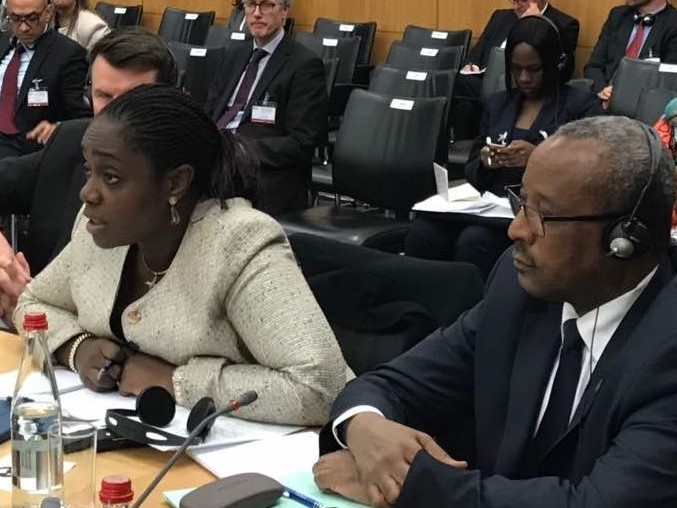Lion Oshiyemi Pledges redefinition, reposition as he emerges 20th President of OGUNCCIMA
Lion Niyi Oshiyemi has been invested as the 20th President of the Ogun State Chambers of Commerce, Industry, Mines and Agriculture (OGUNCCIMA) at the Chamber’s 40th Annual General Meeting.
The investiture ceremony of the new OGUNCCIMA leadership was held on Thursday at Tunwase Hall in Ijebu Ode, Ogun State with top Chamber movement members in attendance.
The President In his acceptance speech, expressed gratitude to the immediate past President, Engr. Mike Akingbade, and the Chamber for entrusting him with the esteemed position.
He pledged to leverage available opportunities to redefine and reposition the Chamber, creating platforms to influence legislation and improve the business environment.
“I am honored to lead this prestigious organization and I promise to harness all available opportunities to redefine and reposition the chamber of commerce movement in the state”.
“I will continue to create platforms to influence legislation and other measures affecting trade, improve the business environment, and build a Nigerian economy of thriving business opportunities through networking”.
“I wish to enjoin you all who represent businesses, if you have not joined the OGUNCCIMA, please come and lend your voice to others. The bigger the network, the louder the voice and the stronger the influence”.
“Our advocacy seeks to ensure that the business community can have its voice heard on issues that are important to it”.
“I’d like to introduce to you my Presidency’s flagship project “OGUNCCIMA Secretariat”: The project is massive and requires a lot, I therefore seek your support and look forward to partnering with all stakeholders – the state government and it’s agencies (Federal and State Ministries, Departments and Agencies), development partners, the diplomatic communities, the media, and other stakeholders”, he said.
Oshiyemi also praised the founding fathers of the Chamber, saying, “I laud the vision of our founding fathers, who have laid a solid foundation for us to build upon. I am committed to taking OGUNCCIMA to greater heights and making it a beacon of hope for businesses in Ogun State.”
The Ogun State Hon. Commissioner for Industry, Trade and Investment, Hon. Adebola Sofela Emmanuel, in his keynote address said by the Permanent Secretary, Ministry of Trade and Investment, Dr. Olu Ola Aikulola, said over the years that the Ogun State Chambers of Commerce, Industry, Mines and Agriculture (OGUNCCIMA), has not only remained a beacon of entrepreneurial excellence, but also partners in driving economic growth, fostering trade, and promoting investment opportunities in the state.
He said: “I would like to extend my heartfelt congratulations to OGUNCCIMA on this historical movement. Forty years of dedicated service to the industrial, trade, and agricultural sectors of Ogun State is no small feat”.
“Over the years, the Ogun State Chambers of Commerce, Industry, Mines and Agriculture (OGUNCCIMA) has not only been a beacon of entrepreneurial excellence but also a pivotal partner in driving industrial growth, fostering trade, and promoting investment opportunities”.
“Today, as we elect new officers to continue this legacy of excellence, I urge all members to approach this process with a spirit of unity, fairness, and foresight. The future of our chambers and the economic well-being of our state depend on the collective wisdom and strategic vision of our leaders”.
“For us, as a government, we will continue to put in place Institutional mechanisms that will guide our various developmental programmes in all sector of the economy”, he added.
In his remarks, NACCIMA President, Dele Kelvin Oye, represented by the Director – General, Olusola Obadimu, urged the new leadership of OGUNCCIMA to reflect on the the Chambers achievements and chart the course for the future.
“Today, as we gather for the 40th Annual General Meeting and Investiture of New Executives, I want to charge the new leadership to be dedicated and build on the achievements of the past administrations”.
“On behalf of NACCIMA, I congratulate the new officers and may our shared efforts continue to bear fruit, and may new officers lead us for greater heights of success and prosperity”, he concluded.


 Business6 months ago
Business6 months ago
 Business6 months ago
Business6 months ago
 celebrity radar - gossips6 months ago
celebrity radar - gossips6 months ago
 celebrity radar - gossips6 months ago
celebrity radar - gossips6 months ago













You must be logged in to post a comment Login